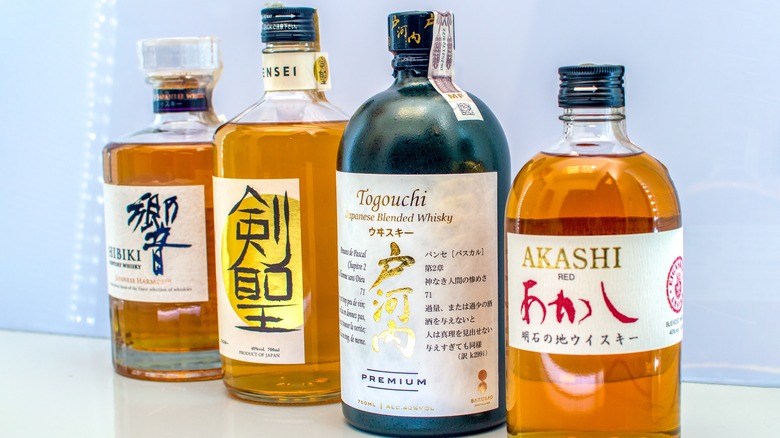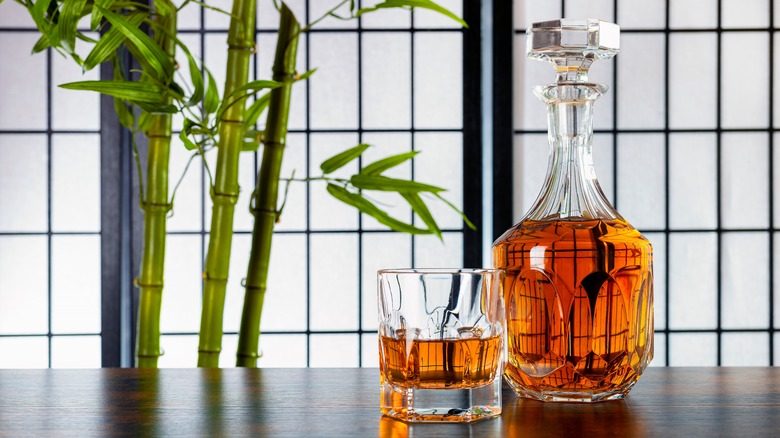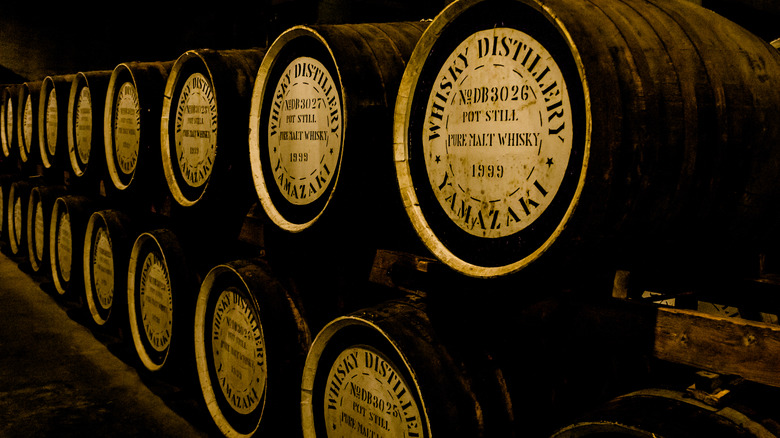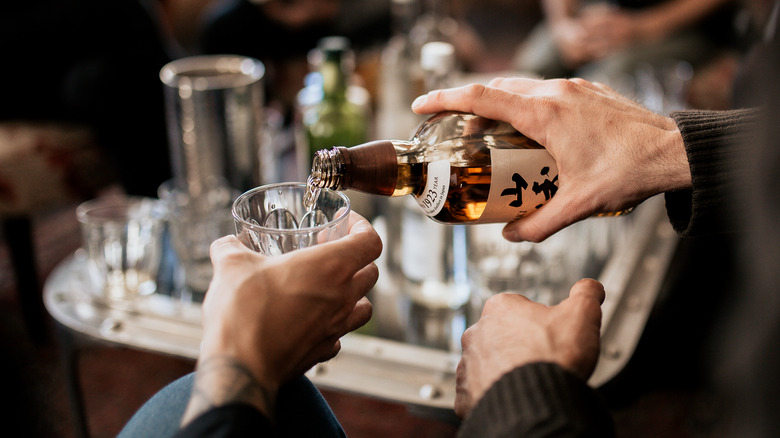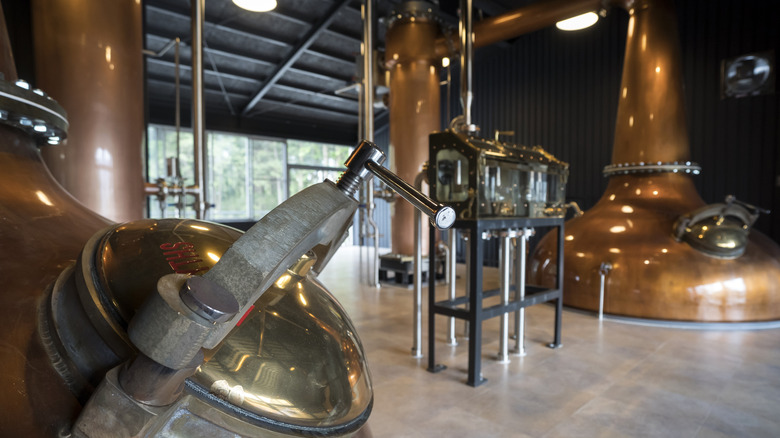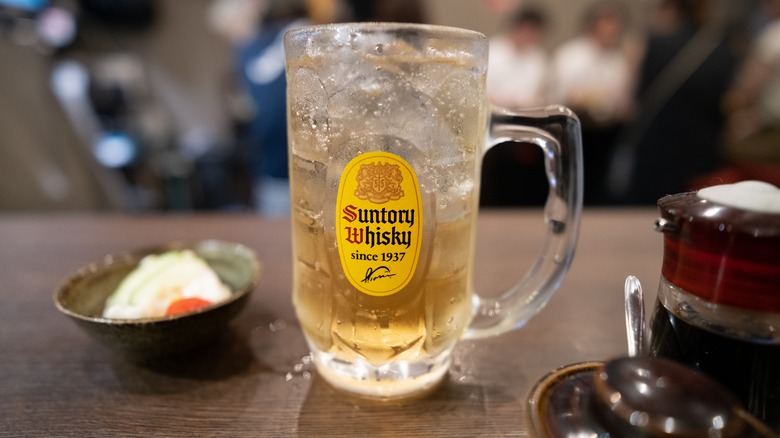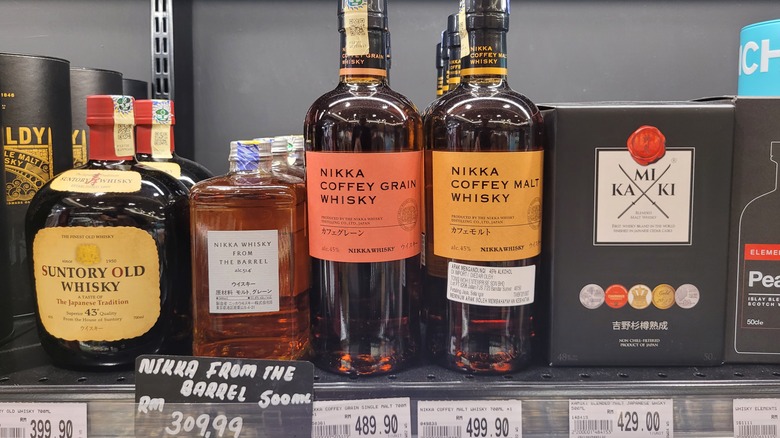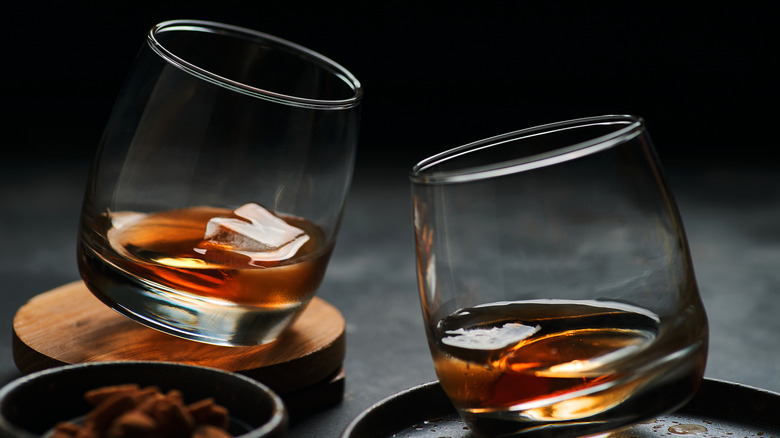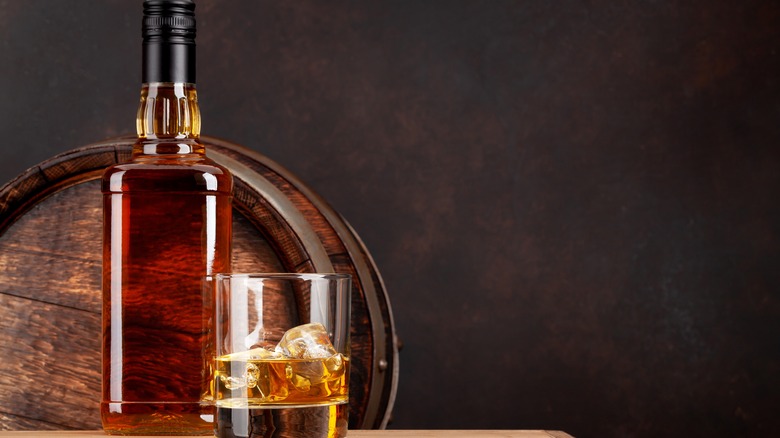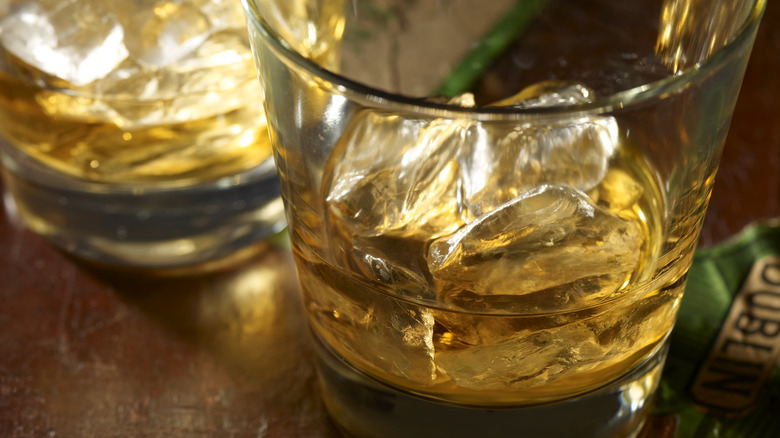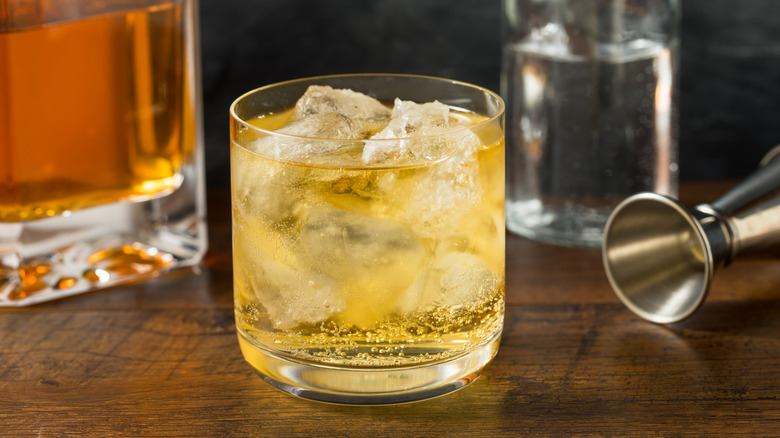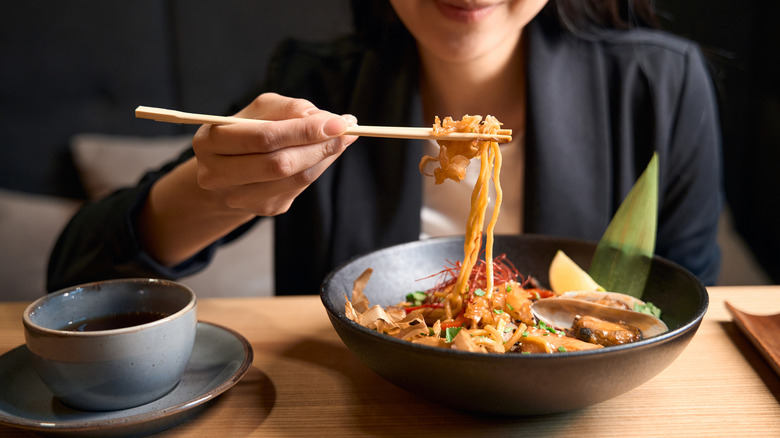Connoisseurs Distill The Ultimate Guide To Japanese Whisky
Japanese whisky is a light, smooth liquor made with malted barley and other various ingredients. Unlike other types of whiskey, it has a delicate, floral taste that oozes refinement. As such, it has become a favorite of whisky connoisseurs. It is also a great way for new drinkers to start exploring the beloved world of whisky.
Understanding all the nuanced details of Japanese whisky may be somewhat challenging for most of us, but ask a whisky expert and they have a way of explaining so anyone can learn (and love) it. That's why I checked in with a few Japanese whisky experts to help me create this ultimate guide.
Our first expert is Chris Walster, a whisky expert at The Cask Connoisseur with more than 30 years of experience in the field. I also got excellent feedback from Casey Small, consultancy director at drinks agency Wilde Toast (they regularly work with leading whiskey brands like The Macallan, Laphroaig, and Suntory). Last but certainly not least, a team of Japanese whisky experts at Izakaya Den, directed by master chef and owner Toshi Kizaki provided me with tons of amazing details and insights. As the team behind a collection of highly-revered Japanese restaurants in Denver, Colorado, I can tell you they really know their stuff too. Once you hear what all these experts had to say, I wouldn't blame you if you went straight to the closest Japanese restaurant to give the delectable spirit a try.
What is Japanese whisky?
As the name tells us, Japanese whisky is a type of whisky from Japan, but that description just barely scratches the surface. This unique spirit has a lot to offer and it does it in its own unique way. According to the team of experts at the Izakaya Den, "Japanese whisky is known for its delicate nature, with a strong focus on quality and finesse. The use of mizunara casks further enhances its uniqueness, imparting a distinctive floral spiciness to the final product." They also noted that Japanese whisky has specific distillation limits which demand "the final product contains at least 40% ABV," but no more than 95% ABV.
When asked to describe Japanese whisky briefly, one of our other experts, Chris Walster, The Cask Connoisseur, says, "I often think of Japanese whisky as a smooth, delicate, and balanced whisky, which can either be floral or fruity. There are other flavours depending on the distillery, which may come to the fore. However, these flavours can also be associated with Scotch whisky or Irish whiskey. Because of its delicate and complex nature, it's often thought of as the perfect combination for newcomers and connoisseurs alike."
For anyone looking to explore the world of brown spirits, Japanese whisky may be a fantastic place to start (or finish for that matter), but you should know it also comes at a premium price. Even so, the spirit has become quite popular among whisky/whiskey lovers.
History of Japanese whisky
While you'd think it's safe to assume Japanese whisky got its start in Japan, the actual origin of the spirit has roots in Scotland. Surprise! Whisky connoisseur Chris Walster, The Cask Connoisseur, has this to say: "One of my favorite stories about Japanese whisky is that the first Japanese distillery was set up by a man who learned to distill in Scotland. This was in 1918, and the man was called Masataka Taketsuru. He was given the chance to go to Scotland, and he became the first Japanese ever to master how to make whisky. Showing quite clearly that the roots of all whisky are based in Scotland!" So, while Japanese whisky is indeed distilled and bottled in Japan, the knowledge used to do such originally came from Scotland. Pretty cool, right?
Walster elaborates by saying: "On the flip side, Scottish distilleries are taking note of the Japanese distilling process though, by trialing, for example, Mizunara oak for their whisky barrels." As you can see, the knowledge used to distill whisky is somewhat fluid and experts are more than willing to take tips from other producers and implement them in ways that benefit everyone.
What does Japanese whisky taste like?
Japanese whisky may taste similar to other types of whisky, like Scotch, Irish, and American, but it features unique tasting notes and traits that undeniably make it a spirit all its own. According to Casey Small, consultancy director at drinks agency Wilde Toast, "Japanese whisky has all the hallmarks of its nation, it is delicate, light, and full of refined character. The Japanese are known for their focus on detail when creating products and their approach to whisky is no different — you can literally taste the attention to detail and delicacy of the liquid."
Small adds that it's challenging to describe what Japanese whisky tastes like, because there are so many different styles. However, our experts at Izakaya Den summed it up quite nicely: "Japanese whisky is generally lighter, partly due to the higher-altitude locations of many distilleries, which allow for slower maturation and more refined flavors. They are known for delicate floral notes and subtle fruitiness, with each brand offering unique characteristics." For example, they describe Yamazaki 12 as being floral, light, and fruity. While Hakushu 12 is fruity with a little peat, and notes of wood. On the other hand, Nikka Coffey Grain is grain-forward, which you might expect, but with a sweetness they say will appeal to lovers of bourbon. Izakaya Den says, "Komagatake is distilled at high altitude, resulting in a complex, refined spirit through slower aging" and "Akkeshi Single Malt is a heavily peated whisky aged in ex-bourbon barrels, delivering bold, rich, and clean flavors."
How is Japanese whisky made?
Japanese whisky production isn't uniform across all brands, but there are some distinct traits. The team at Izakaya Den reports that, "Japanese whisky is crafted in a manner similar to Scotch whisky, with some distinct nuances. The base ingredients are typically made from malted barley, though other elements like cherry blossom may also be included. The distillation is primarily done in pot stills to retain complex flavors, though some distilleries use column stills. The maturation involves aging in wooden barrels, often repurposed from bourbon, sherry, wine, sake, or Japanese plum liqueur." Plus, blending occurs with help from various distilleries, ages, and casks. An example of this can be found with the Chichibu Distillery. It blends Ichiro's Malt & Grain with a range of whiskies, including Scotch, Irish whiskey, Canadian rye, and American whiskey. Each specific type of whisky is aged in its respective country, some for as few as three years and others up to 20 years. After that, Chichibu ages them again for between two and three years, which results in more character.
That seems like a lot of variables, but the experts at Izakaya Den went on to explain the concrete regulations Governing Japanese Whisky. The base material "must include malted grain, though other grains may be used." And the water source has to be from Japan. In addition, the entirety of production "from mashing, fermentation, and distillation to barrel storage must take place within a Japanese distillery." This also includes the bottling process. To top it off, the folks at Izakaya Den say Japanese "whisky must be aged for at least three years in wooden casks with a maximum capacity of 700 liters."
How to drink Japanese whisky
How you drink Japanese whisky is up to you, but our experts have several suggestions. The expert team at Izakaya Den told me, "Japanese whisky can be enjoyed in various ways, depending on personal preference. Adding a few drops of water can enhance its aroma and flavor. Many work exceptionally well in cocktails. In Japan, it is common to dilute whisky with water to create 'Mizuwari,' which is often enjoyed with meals, or to prepare refreshing highballs with soda."
Japanese whisky expert Chris Walster, The Cask Connoisseur, says, "I would always recommend people drink it to their taste, so they should never be influenced by others. Having said that, my preference is always neat and then if you want to, you can add a few drops of water." He also notes that while ice is popular, it lessens the whisky flavor overall. So, if you prefer a chilled drink he recommends investing in whisky stones to avoid a reduction in flavor.
Casey Small, consultancy director at drinks agency Wilde Toast, summed it all up by saying, "I guess the key for anyone drinking whisky is what gives your palate the most enjoyment. Is it neat, with a little water or stirred into an Old Fashioned cocktail?" He went on to explain that, while there are no actual rules when it comes to drinking Japanese whisky, some drinkers prefer it neat — because they can really taste the refined flavor and deep characteristics. As you can see, the experts agree that less is more.
Why is Japanese whisky so expensive?
Compared to other types of whisky, Japanese whisky is pretty pricey. According to the team of experts at Izakaya Den, "The premium pricing of Japanese whisky is driven by several factors, including high demand, the lengthy aging process, international acclaim, rarity, distillery locations, and the cost of raw materials."
Japanese whisky expert Casey Small, Wilde Toast, says, "There are a few reasons why Japanese whisky is more expensive than its counterparts." He mentions that supply just can't keep up with demand. "The global appeal of Japanese whisky has been exponential in the last 10 to 15 years and this has pushed prices up due to relative scarcity." He explains that dedication to making Japanese whisky elevates the price. "Couple that with the importing of ingredients (such as Scotch barleys) and the widespread use of the pricy Mizurana barrels, and you have yourself some pretty expensive liquids," says Small. He also feels that Japanese whisky's iconic status contributes to its elevated price: "It scooped so many awards and is put on a pedestal by whisky experts and aficionados globally — it's very much seen as world-class." But Small adds that he believes the price is justified in many cases.
Even so, Chris Walster, The Cask Connoisseur, reports that the price seems to be declining with some bottles: "For example, many 18 year old Japanese malts have decreased by $150 per bottle (around 19%)."
Japanese whisky vs American bourbon
Japanese whisky and American bourbon have a lot in common, but they also vary greatly. One of the main differences is flavor. Casey Small, Wilde Toast, says that "bourbon is typically sweeter and chock full of vanillas, big oaks, and toffee flavour," whereas Japanese whisky is more floral and delicate overall.
The Cask Connoisseur's Chris Walster also had some things to say about how American bourbon and Japanese whisky differ: "Whilst bourbon is similar (but also dissimilar) to Scotch, in my mind Bourbon is sweeter and more heavy. This is due to the various mashbills, which can use corn and other grains." In addition, the regulations matter: "It can be sold at two years of age, instead of the more usual three years. Additional changes are that the bourbon barrels cannot be reused, which possibly does not help when blending batches together."
Of course, another glaringly obvious difference between whisky and bourbon is that bourbon is made in the United States, and Japanese whisky is produced in Japan. All that being said, they are more alike than other spirits such as gin or tequila.
Japanese whisky vs Scotch whisky
While the differences between Scotch whisky and Japanese whisky are more subtle, the details really matter. When asked about how the spirits compare, Chris Walster, The Cask Connoisseur, says, "Japanese whisky is often claimed to have a greater emphasis on balance and harmony, whereas Scotch whisky is more robust." He also notes that "Japanese whisky is heavily influenced by Scotch, in fact in the past, Scotch whisky was often shipped to Japan, and was then called Japanese whisky." Surprising yes, but he explained that new regulations from the past year or so should have put an end to this somewhat misleading practice.
Wilde Toast's Casey Small confirmed the close-knit relationship between the two spirits: "In general terms, Japanese whisky's closest cousin is Scotch (as it's made in a similar way) so it showcases a drier and smokier flavour" compared to other types of whiskey. He went on to say that refinement "is a hallmark of Japanese whisky." As opposed to Scotch distillers who aim to keep the flavor profile 100% consistent, Japanese "distillers are always trying to refine the liquid," which he notes, "is unsurprising given the Japanese philosophy of kaizen — to continuously improve."
Japanese whisky vs Irish whiskey
As you probably guessed, Irish whiskey comes from Ireland so that's one main difference between it and its Japanese whisky cousin. Aside from that and the variation of spelling (one is spelled whisky and the other whiskey), what sets them apart?
Whisky expert Chris Walster, The Cask Connoisseur, weighed in on the matter with some interesting insights: "Although perhaps a misapprehension, Irish whiskey is three times distilled rather than the common twice distilled. This tends to make Irish whiskey smoother and lighter." But Walster also points out that Japanese whisky has a smooth and lightness to it as well — and he adds that it "tends to have greater depth and complexity of flavour." When you consider what we know about Japanese whisky being light and delicate, this is a tad bit surprising, but I'll take Walster's word for it. After all, he has more than 30 years of experience exploring the brown spirit in its various forms.
Whisky is a prestigious gift in Japan
The whisky experts at Izakaya Den brought me a fun fact about Japanese whisky: "In Japan, whisky is often given as a prestigious gift, especially to individuals in senior positions, reflecting its status as a high-end offering." As we know, Japanese whisky typically comes at a premium price. As such, it serves as a wonderful gift, especially when the Japanese want to convey the importance of a particular relationship. Unlike here in the United States, giving gifts is much more symbolic so using Japanese whisky to express respect is quite the accolade, and it speaks to the reverence held for the spirit.
Bringing a gift is considered proper manners in the United States if you are coming to a person's home for the first time. However, in Japan, this tradition is taken much more seriously and the custom is woven into the fabric of the culture. It is a prominent part of creating and sustaining relationships, both socially and in the business world. When gifts are given it symbolizes respect and gratitude, and as it turns out, Japanese whisky makes an outstanding gift.
A whisky highball is one of the most popular drinks in Japan
Here's something you also might not know: Japanese whisky is used in one of the country's most popular drinks: The whisky highball. As expert Casey Small, Wilde Toast, tells me, "Whisky is such a big part of Japanese culture — the whisky highball is one of the most common drinks in the country which is globally unique."
You may be thinking, wait, isn't a whisky highball just soda water and whisky? And you'd be right. While it may seem pretty basic, its simplicity is what makes the drink. Mixing Japanese whisky with club soda and ice provides the drinker with a smooth, fizzy cocktail that more than allows the subtle tasting notes and elements of the spirit to shine through. Club soda doesn't mask the elegance of Japanese whisky as almost any other mixer would.
The exception, of course, is water. Interestingly, the team at Izakaya Den also notes that "the Mizuwari style of mixing whisky with water remains a popular way to enjoy it with food." Essentially, this is the same as the highball, just without bubbles. Of course, it's all about the details too. Using Japanese whisky certainly makes a difference compared to other types of whisky. Taking advantage of a premium one is even better.
Japanese whisky pairs perfectly with Japanese food
Whiskey expert Casey Small, consultancy director at drinks agency Wilde Toast, says, "Another interesting fact is that Japanese whisky actually pairs really rather well with Japanese foods such as ramens, sushi, and fish. The refined flavours and delicate nature of the liquid can enhance Japanese dishes and many top restaurants will pair whiskies with their menu." Considering Japanese whisky comes from Japan, it's not too surprising it complements the regional cuisine. In fact, it seems like the obvious choice. Still, don't underestimate how well the spirit can elevate Japanese cuisine. Small urges you to enjoy it with sushi or ramen for a pairing worthy of a connoisseur.
While all of this makes perfect sense, don't let it dissuade you from pairing Japanese whisky with other types of cuisine. The spirit's delicate flavors and unique tasting notes work well with many regional dishes. Japanese whisky complements anything from hearty cuts of steak to roasted chicken to BBQ and more. Treat it like you would other types of whiskey (and whisky) when pairing it with foods and you'll be glad you did.

